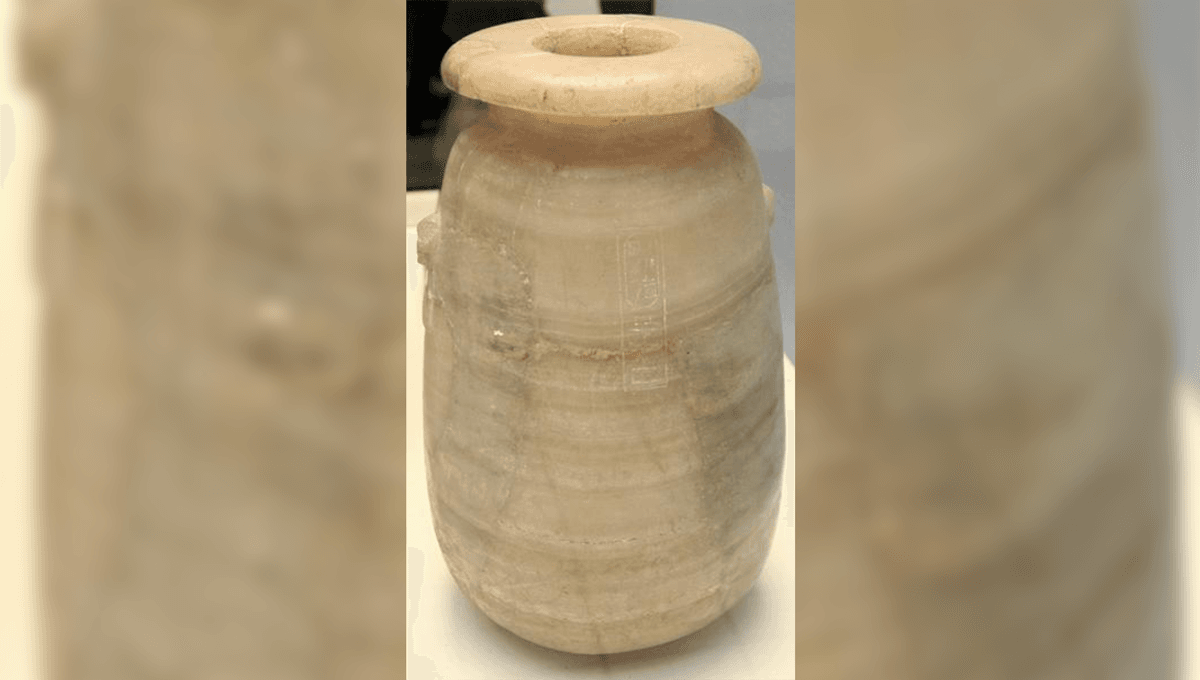
An extremely rare Egyptian alabastron that was once owned by a royal elite has been found to contain traces of opium. This surprising discovery suggests that the narcotic may have been highly revered and widely consumed in ancient Egypt, with kings and rulers even choosing to carry the substance with them on their journey through the afterlife.
The rest of this article is behind a paywall. Please sign in or subscribe to access the full content.
“This study presents the clearest comprehensive evidence yet that opiates were a broader part of ancient Egyptian society and mark the first time that the contents of an inscribed Egyptian alabastron have been identified through scientific techniques,” write the authors of a new study about the artifact.
Housed in the Yale Peabody Museum’s Babylonian Collection, the piece in question is an alabaster vase inscribed in four ancient languages – including Akkadian, Elamite, Persian, and Egyptian – and bears the name of the fifth-century BCE Persian ruler Xerxes I, along with his title of “Great King”.
According to the researchers, fewer than 10 intact inscribed objects of this kind are known worldwide, and all are thought to have been held by rulers or other elites. Using gas chromatography-mass spectrometry, the study authors identified noscapine, hydrocotarnine, morphine, thebaine, and papaverine within the vase – all of which are diagnostic biomarkers for opium.
This finding may finally settle the long-standing debate regarding the function of these royal vessels, which some scholars believe were used to store perfumes or cosmetics. Based on their results, however, the study authors suggest that the jars were in fact ancient baggies that contained the dope of prominent rulers.
Previously, traces of opium were found on a set of jugs discovered in a tomb in Sedment, which lies to the south of Cairo and was used as a cemetery for less wealthy individuals. Together, these discoveries indicate that the drug may have been used by both commoners and elites in ancient Egypt.
This, in turn, raises some interesting questions about the contents of other ancient alabaster vessels, including those found in the tomb of Tutankhamun. According to the study authors, “many of the looted alabastra from Tutankhamun’s tomb were clearly observed to have the same sticky, dark-brown organic remains with distinct odor that match the characteristics of dried opium latex.”
“Therefore, it remains imminently possible, if not probable […] that at least some of the […] vessels […] in fact contained opiates as a part of a long-lived ancient Egyptian tradition we are only beginning to understand,” they write.
The researchers even go as far as to suggest that alabaster vases of this kind may have been synonymous with opium, in the same way that “hookahs today are attached to shisha tobacco consumption.” And while this last point may be somewhat speculative, they assert that “it is now abundantly clear […] that opiate use was […] a fixture of ancient daily life.”
The study is published in the Journal of Eastern Mediterranean Archaeology and Heritage Studies.
Source Link: Opium Found In Rare Ancient Egyptian Vase Dedicated To “Great King” Xerxes